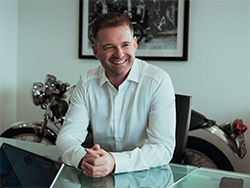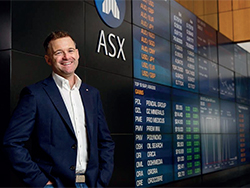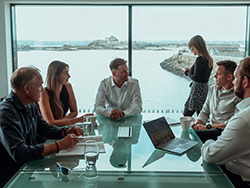 Channel Islands-founded SRJ Technologies started life supplying pipe repair and replacement services to the oil and gas industry but, following a successful listing, is diversifying into a wider range of services across different sectors. CEO Alex Wood explains how being based in Jersey set it up for success, what’s next – and why he is supporting others on the islands to achieve their dreams… Photos by Studio M
Channel Islands-founded SRJ Technologies started life supplying pipe repair and replacement services to the oil and gas industry but, following a successful listing, is diversifying into a wider range of services across different sectors. CEO Alex Wood explains how being based in Jersey set it up for success, what’s next – and why he is supporting others on the islands to achieve their dreams… Photos by Studio M
What does SRJ Technologies do and how do you position yourselves as a business. What’s the unique proposition?
We’re an asset integrity business. We provide specialised engineering services and pressure containment management solutions – permanent or temporary pipe repair or replacement – predominantly to the oil and gas industry.
But where we see real value is in offering a wider range of asset-integrity consulting services, helping our customers to better understand the operational risks and where best to focus resource to minimise these. That’s all about digital solutions that work with client platforms to analyse data and highlight leak prevention and repair programmes.
What’s essential to our proposition is that we use pre-qualified service providers and manufacturers local to our customers. We’re what we call ‘geolocation-flexible’.
We very much designed that business model and the technology to fit in with the global desire for local manufacturing, reduced complexity and reduced manpower via digital capability.
What’s interesting is that we’re kind of perceived by the market to be a disrupter, while we very much feel this approach is what makes us synergistic with the marketplace. We manufacture our products in-country, utilising an IP that is coming out of Jersey.
Why is local manufacturing such a key part of your proposition and so in demand?
It’s all about the way customers operate. Saudi Arabia has something called IKTVA (In-Kingdom Total Value Add). UAE has a system that gives you 30% delta between a foreign-sold product and a locally manufactured product.
Australia has something similar, too, as does Brazil. It’s pretty much the case that every country now has some kind of incentive in place for using in-country products. So we have developed a product that can be manufactured in-country and we have pre-qualified service providers in those regions.
Of course, what we provide is a high-end, premium element. The benefit of our technology is that it vastly reduces the loss experienced by the customer.
Getting back online and producing whatever you’re producing as quickly as possible is essential – and the downtime is far more expensive than the cost of our product will ever be. So that’s really where we are.
Tell us a bit about your background.
I actually grew up in Norfolk, not far from Norwich. After school, I went to Bournemouth University to do a degree in interface design, which had a bit of computer programming in it and a bit of neural networking in it. It was called human-computer interaction.
But I worked out part-way through that most people probably aren’t going to be getting a guy from Bournemouth University to design MiG jet heads-up displays – they’re going to get a guy from Oxford University and a guy from MIT. And I worked out that I was probably headed for Argos middle management.
So I turned left at Piccadilly and went into construction and worked for several businesses in the UK. Eventually I moved to a family firm in Norfolk, generated them quite a bit of work over a two-year period, and then took the opportunity to go and work on the Dubai airport build, which was a dream for a 23-year-old.
I lived in Dubai for three years, played polo and generally enjoyed life – probably a bit too much – before my wife came and saved me from all of that. I then worked in Africa for a while, in mining, and in Australia. So I moved around and kind of educated myself, came across this proposition, and moved to Jersey.
Why did you come to the Channel Islands, and how did the opportunity to launch SRJ Technologies evolve?
I’ve been an offshore tax resident since around 2003 and I’ve kind of bounced around a bit. I lived in the Middle East for the longest period on that journey, mainly in Dubai.
I also spent time in Australasia and West Africa, working in oil, gas, mining and mineral processing. So I was very much in this space already when I came across this opportunity to launch SRJ.
I and John Manning, an engineer by trade, had been asking ourselves how an industry like oil and gas, where you are talking highly flammable substances and pumping them at high pressure through pipes, didn’t have a weld-free pipe coupling that could be used for quick repairs.
It was a simple as that. We decided that there was a better way to mend pipes in the highly flammable oil and gas industry – with a weld-free pipe coupling.
The Channel Islands came into play because our initial finance came from an investor based in Jersey, and most of our other investors up to the point of public listing were Jersey-based.
We found offices in Jersey and we really felt the Channel Islands offered us the professional partners we needed to grow the business from a concept to a registered player in the marketplace.
We don’t manufacture our products here – but our IP is held here, and the Channel Islands have really driven where we have reached today.
As I say, we were massively well supported in the Channel Islands. One of the obstacles we hit was that we took an innovation grant from the Jersey Innovation Fund, which had some negative press coverage – and that really was a struggle because it reduced the appetite for investors to have an association with our business. So we actually paid that back, in full, a year early.
 From there, you had an IPO and listed on the Australian Securities Exchange. Why Australia?
From there, you had an IPO and listed on the Australian Securities Exchange. Why Australia?
As we started to achieve some commercial success – deploying the technology in Houston – we felt the next real opportunity was to look at a listing.
We didn’t really find appropriate appetite or understanding for our sector in the London market. Through one of my contacts, Mick Doohan – a world former superbike and Grand Prix motorbike racer, who is now a lead anchor on Sky TV for MotoGP – I became more aware of the opportunity of the Australian market.
Mick is a Queensland boy, a real Australian ambassador type, and is incredibly well connected. He was very helpful in getting us in front of the right people – we made what was only the 17th IPO of 2020. That was a very important move for us, and we were delighted when we saw the share price jump 60% on opening.
Aside from Mick Doohan’s involvement, you had some other well-known backers involved in SRJ in the early days. Was that useful and did it help with your profile-raising efforts?
I’d say Mick’s business connections were the most important thing for us back then. He was vice president of Formula One Australia. He owns a Melbourne private jet terminal, and another on the Gold Coast.
He’s a wealthy businessman on the Gold Coast and, as a result, he’s friends with all the richest Australians.
It was through Mick that we were also introduced to former Formula One team owner Eddie Jordan, who also became involved in the business.
That was great for media interest and for attracting some focus on us – but the involvement of people like Mick, who could really help us on a business level and in terms of meeting the right people, was far more valuable to us than the ‘celebrity’ backers.
Was access to funding and grants important in the early days – and did they play a role in making Jersey the right location for you?
It was massively important. I mean, this stuff’s expensive. It isn’t easy to get done. And, relatively speaking, it’s expensive to do business in Jersey.
In fact, if I have any concern about the jurisdiction, it’s that if it becomes too expensive to do business there, it could be very difficult to make it stick for people in the early stages of their ventures, because you’ve got to get through that development cycle to get anything to the point where it really delivers.
We touched on the Jersey Innovation Fund specifically earlier. But access to funds and grants generally is essential in helping to get a business off the ground in the Channel Islands – and I hope that sort of support continues.
Around the time you listed on the Australian Securities Exchange, you also signed a deal with Japanese conglomerate Mitsui. How is that deal integral to your growth plans?
Yes, we signed a strategic alliance with Mitsui and it really was quite a coup that I don’t think was fully appreciated on the islands at the time.
It allows us to promote our range of services to Mitsui’s portfolio of infrastructural assets. That’s been massive for us.
Mitsui is a majority owner of the world’s largest provider of floating platform solutions for oil and gas. It’s a business that turned over $57bn last year. It’s a business that owns eight power stations. It owns the world’s biggest production storage and offloading company, MODEC.
So it’s an enormous buyer of our product. And the ability for a tiny company like ours to have the clout of a $57bn-turnover company behind us is just phenomenal. It’s a major global player and we hope it can be enticed to be a bigger shareholder in SRJ going forward.
Are such alliances likely to be your route to further growth going forward?
It’s definitely something we want to explore in all regions, and we’re already making strides. Late last year, we signed an agency agreement with Zamil Operations & Maintenance in Saudi Arabia, to expand into that region. That, again, has put us in an amazing position.
You mentioned the move into digital solutions in order to help clients manage their programmes. How far into that journey are you?
We’re making some strong strides there, too, led by Dr Paul Eastwood, our Technical Director, who was previously head of digital solutions at Petrofac.
Last year, we delivered a digitised coupling with sensor-embedded technology, which was a bit of a milestone, and we’ve just completed our first app. That will be deployed into some of our customers soon and will guide them through dealing with containment and maintaining compliance and regulation.
Another of our team is considered one of the top people in the world for vibration fatigue analysis.
That’s something the IPO has allowed us to do – bring in a world-class team. And it’s because of that team that we have been able to adapt our offering to one where we can manage clients’ operations on a consultancy basis supported by digital developments.
 From where have you assembled that team – and how important is it to be bringing in people from other big-name businesses?
From where have you assembled that team – and how important is it to be bringing in people from other big-name businesses?
It’s really important to us. We work in an industry where reputations and backgrounds are important and we’ve worked hard to assemble a team with amazing credentials.
I already mentioned Paul Eastwood, who spent 17 years at global energy services giant Petrofac. One of our senior consultants, David Capeling, also spent eight and a half years with Petrofac.
Bill Skailes is one of the world’s best-known experts in vibration fatigue. Our financial management comes from a former senior audit manager at PwC in Jersey.
Roger Smith is our Managing Director of Middle East and America – and he’s built and sold multiple companies in the industry, including Bureau Veritas and Petrofac.
And Rob Pinchbeck, our Chairman, brings more than 40 years of international experience, principally from BP and Petrofac. So you can see the quality of the team and why that will open doors for us.
What other plans do you have for growth, and in which regions do you expect to see a lot of activity over the next 12 months?
One of the key markets and locations to be present in this year will be Houston, North America. And Brazil is probably the most important territory. They’re the two most important for us development-wise, given that we’re already present in the Middle East, Australia and Europe.
They’re the key geographies. We don’t have an objective to make acquisitions – but if there are acquisitions that are clearly beneficial, or partnerships to be made in areas we currently aren’t active, then there may be logic to such activity.
Do you see yourselves diversifying out of your core oil and gas sector? Is that part of your longer-term vision?
Yes, that was part of the logic of coming to Australia – that we’re not just chasing oil and gas revenue. We’ve already delivered revenues this year in mineral processing, mining and fertiliser production. We need to progress outside of the sector.
Let’s remember, everyone is obsessed with the ending of the oil and gas market. Lots of the vessels, the floating production storage and offloading units on these gas fields have another 40 years to run on their leases. Everyone needs to get away from coal.
There is a general energy transition to occur, moving to the cleaner fossil fuels – that’s probably a 40- to 50-year journey at the moment. So, we’re already generating revenues outside of oil and gas. And Australia has been a great proving ground to get into aluminium production, too.
You touched on hoping that Jersey remains competitive in terms of the cost of doing businesses. But how important do you see the Channel Islands being to businesses like yours going forward?
The Channel Islands are a grand place to live and it was a very attractive opportunity to come here – due to the funding available and the great help and support we found in terms of investment and everything else.
Moving forward, it’s important the islands protect that offering. We all understand the requirements for due diligence and anti-money laundering and so on, but the islands have to resist an overly eager acceptance of regulation. If you’re not careful, it pushes the requirements for legal and financial services really high.
The problem with that is it stifles innovation in other sectors. We opened a bank account in Australia in two weeks and it cost very little. If I look at the cost of my staff opening a bank account in the islands, and the fact that we need an independent sign-off from a lawyer and a trust company involved – it becomes costly.
So, I think it’s really important that we protect the structures that allow businesses to establish themselves in the islands and to innovate.
Finally, what other interests do you have in the Channel Islands?
We have some fingers in some other pies. I own part of a business called AVI – which was responsible for building that weird-looking office that sits at La Collette in front of the Sunseeker shed.
We’re working with a young artist, Bluntroller, to help him raise his profile and progress his career.
We previously bought part of freight firm Huelin Renouf, buying the DSV business when it went down, but we basically got squeezed out of the market and ended up losing money and giving it away.
So, it’s not all been plain sailing. We had our fingers burnt a little by trying to run before we could walk as a new business. But we’ve had great success in other areas.
We love the islands, we’re trying to do interesting things, we’re trying to add a bit of value. We like being here and we want to keep doing interesting things.
FACT FILE
Name: Alex Wood
Position: CEO, SRJ Technologies
Home: Jersey
Studied: Bournemouth University
Family: Married, with two young children
Pets: A chocolate Labrador called Rudy
Other interests: “We’re helping develop some acts on the islands, including the artist Bluntroller, using our connections and contacts to help them develop and gain some exposure.”